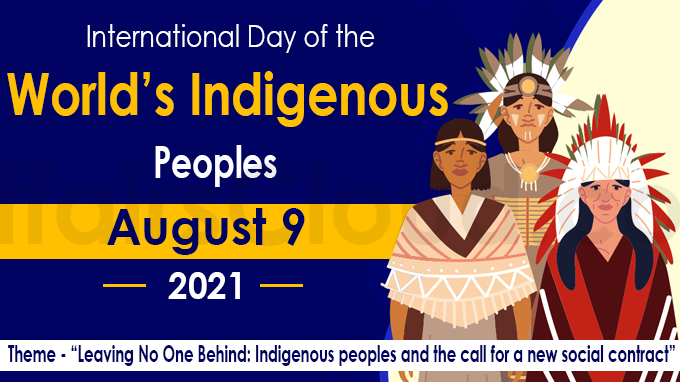 The United Nations (UN)’s International Day of the World’s Indigenous Peoples is annually observed across the globe on 9th August to recognise the contributions and achievements of the indigenous people across the globe, who have a vast diversity of unique cultures, traditions, languages and knowledge systems.
The United Nations (UN)’s International Day of the World’s Indigenous Peoples is annually observed across the globe on 9th August to recognise the contributions and achievements of the indigenous people across the globe, who have a vast diversity of unique cultures, traditions, languages and knowledge systems.
The day aims to promote and protect the rights of the world’s indigenous population.
The day is also known as “World Tribal Day”.
The theme of International Day of the World’s Indigenous Peoples 2021 is “Leaving No One Behind: Indigenous peoples and the call for a new social contract”.
Background:
i.The United Nations General Assembly(UNGA) adopted the resolution A/RES/49/214 on 23 December 1994 and proclaimed the 9th August of every year as the International Day of the World’s Indigenous Peoples.
ii.The first International Day of the World’s Indigenous Peoples was observed on 9th August 1995.
Why August 9?
The day marks the first meeting of the UN Working Group on Indigenous Populations (WGIP) of the Sub-Commission on the Promotion and Protection of Human Rights in 1982 in Geneva, Switzerland.
Events 2021:
The United Nations Permanent Forum on Indigenous Issues (UNPFII) will organize a virtual commemoration for speakers to discuss redesigning a new social contract for indigenous peoples, where their own forms of governance and ways of life must be respected and based on their free, prior and informed consent.
Efforts of UN to support indigenous people:
i.The UN System-Wide Action Plan on the rights of indigenous peoples was developed by the Inter-Agency Support Group on Indigenous Issues in 2015.
ii.This aims to ensure a coherent approach to achieve the ends of the UN Declaration on the Rights of Indigenous Peoples.
iii.In 1990, UNGA declared 1995-2004 as the International Decade of the World’s Indigenous People and 2005-2014 as the Second International Decade of the World’s Indigenous People to strengthen international cooperation to solve the challenges faced by indigenous people.
iv.The year 2019 was observed as the International Year of Indigenous Languages and 2022 to 2032 will be celebrated as the Decade of Indigenous Languages.
Facts about indigenous people:
i.According to the United Nations, around 476 million indigenous people living in more than 90 countries accounting for 6.2% of the global population. They also account for around 15% of the poorest community in the world.
ii.More than 86% of indigenous people work in the informal economy and more than 47% of them in employment have no education.
iii.The indigenous people speak more than 7000 languages and represent 5000 different cultures.




